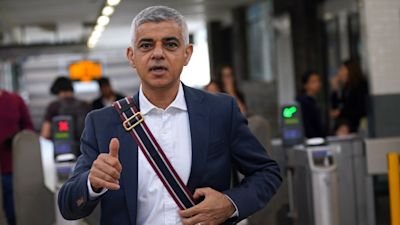The Mayor of London, Sadiq Khan, has launched a new campaign aimed at curbing antisocial behaviour on the capital’s public transport network, with a particular focus on passengers who play loud music, shout into mobile telephones, or otherwise disturb fellow commuters.
Speaking at the unveiling of the initiative, Khan said the move was about “respect, courtesy, and making shared spaces more pleasant for everyone”. The campaign, led by Transport for London (TfL), will roll out posters, announcements, and digital media urging passengers to be mindful of noise levels and to consider the impact of their behaviour on others.
Everyday Frustrations for Millions
The decision follows years of complaints from passengers about deteriorating standards of civility on the Underground and buses. London’s network, used by millions daily, has long been a barometer of the city’s social atmosphere. With rising passenger numbers post-pandemic, tensions have been heightened by crowded conditions, delayed services, and the strain of the cost-of-living crisis.
Playing music out loud through phone speakers, particularly on buses and late-night trains, has emerged as one of the most common irritants. Surveys conducted by TfL suggest that many passengers view such behaviour as emblematic of declining public manners, with a significant proportion admitting it has made them feel unsafe or less inclined to use public transport at night.
“Most Londoners are respectful,” Khan said, “but we all know the frustration of being forced to endure someone else’s playlist at full blast. This campaign is about making journeys calmer, safer, and more enjoyable for everyone.”
Wider Questions of Public Decorum
The Mayor’s initiative feeds into a broader debate about civility in urban spaces. Critics argue that antisocial behaviour on transport is symptomatic of deeper social frictions: overcrowding, inequality, and the erosion of shared norms in an increasingly individualistic society.
London has long prided itself on the unspoken etiquette of its Underground — from standing on the right of escalators to offering a seat to those in need. Yet, in recent years, reports of verbal altercations, loud conversations, and disruptive music have grown, creating an atmosphere many regular travellers describe as more hostile than in the past.
Social scientists suggest that public transport, as a microcosm of the city, reflects wider pressures. “When people feel squeezed economically and socially, their tolerance levels fall,” notes Dr. Rachel Muir, an urban sociologist at King’s College London. “Noise becomes more than an annoyance — it symbolises a lack of respect in a city where respect already feels in short supply.”
Enforcement or Education?
TfL’s campaign will primarily rely on persuasion rather than punishment. Posters will carry messages such as “Your Music, Your Choice – Not Everyone Else’s”, while on-board announcements will remind passengers to keep noise to a minimum. Staff are being encouraged to model positive behaviour and intervene only when situations escalate.
Some Londoners, however, question whether gentle reminders will suffice. Calls have been made for TfL to introduce fines or employ more transport officers to enforce standards. Yet critics of punitive measures argue that such approaches could unfairly target younger people, ethnic minorities, or those already marginalised, exacerbating social divides.
Khan defended the decision to focus on awareness rather than enforcement. “This is about nudging behaviour in the right direction,” he said. “We don’t want to criminalise people for being inconsiderate. We want to encourage Londoners to think twice about how their actions affect others.”
Political Dimension
The campaign also arrives at a politically charged moment. With a mayoral election on the horizon, Khan is keen to demonstrate that he is attentive to the everyday concerns of Londoners, beyond the grand debates about housing, policing, and the environment.
Opponents have dismissed the move as a “distraction tactic”. Susan Hall, the Conservative mayoral candidate, argued that Khan should focus on crime and fare affordability rather than “petty irritations”. “Londoners want to feel safe from muggings and knife crime,” she said. “This Mayor prefers to lecture them about their headphones.”
Yet strategists note that quality-of-life issues resonate deeply with voters, particularly the commuting middle classes who form a crucial electoral bloc. While tackling antisocial noise may not command headlines in the way crime or housing policy does, it addresses the daily irritations that shape people’s perceptions of city life.
Commuters’ Voices
Among commuters, reactions have been mixed. On a morning train at Victoria station, office worker Sarah Collins welcomed the campaign. “It’s about time someone said something,” she remarked. “You get on after a long day and someone’s blasting drill music at top volume. It makes the whole journey miserable.”
Others were more sceptical. A group of students on the Central Line dismissed the posters as “pointless”. “No one’s going to listen,” one said. “People will still play their tunes. If you don’t like it, put your headphones in.”
Bus drivers, often on the front line of disputes between passengers, broadly supported the initiative. “It’s not just about noise,” said Ahmed Khan, who drives a route through south London. “It’s about respect. When people start playing music, arguments follow, and that can escalate fast. Anything that helps calm things down is a good thing.”
A Battle for Public Space
Ultimately, Khan’s campaign raises questions that extend beyond the confines of Tube carriages and bus decks. It is about how Londoners negotiate the use of shared spaces in an increasingly crowded city.
The Mayor himself framed the initiative in precisely those terms: “London thrives on its diversity, but that means we must be even more conscious of how we live together. Courtesy costs nothing, and it makes this great city work better for everyone.”
Whether gentle persuasion will shift habits remains uncertain. For now, the posters will appear across the network, and commuters will judge for themselves whether London’s famed transport etiquette can be revived — or whether the sound of someone else’s speaker will remain an inescapable soundtrack to city life.
